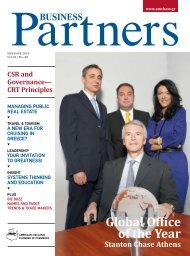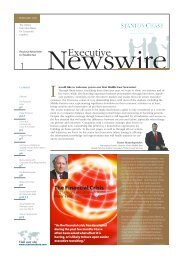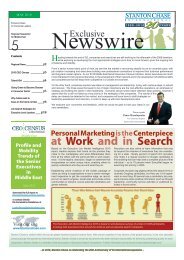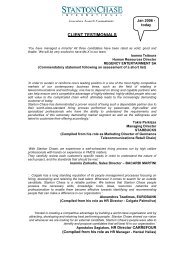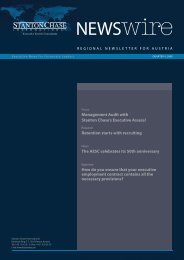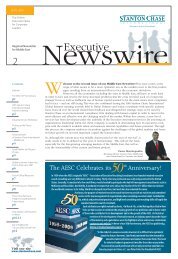WORLD ECONOMY - Stanton Chase
WORLD ECONOMY - Stanton Chase
WORLD ECONOMY - Stanton Chase
You also want an ePaper? Increase the reach of your titles
YUMPU automatically turns print PDFs into web optimized ePapers that Google loves.
OCTOBER 2010<br />
p5<br />
F R O M S T A N T O N C H A S E I N T E R N A T I O N A L<br />
S T A N T O N C H A S E I N T E R N A T I O N A L<br />
Family businesses also<br />
score in times of crisis<br />
By Gert Herold<br />
Executive<br />
Newswire<br />
Whilst some analysts and consultants do not necessarily attribute long-sighted operations, professional<br />
management and use of modern tools to owner-managed companies, in particular family businesses,<br />
they rather mention weaknesses in qualification and succession, recent figures show otherwise. In the<br />
past years owner-managed or family businesses not listed on the stock exchange and regardless of size,<br />
created seven times more jobs in Germany and worldwide, than companies listed on the stock exchange.<br />
On average the largest family businesses also grew in terms of turnover during the crisis<br />
of the past year, whilst the largest listed players almost stagnated.<br />
Personal<br />
Reasons for this are obvious. Whilst listed corporations have to comply<br />
with short-term result expectations, owner-managed companies<br />
can follow long-term strategies – personal short-term profit<br />
expectations take a “back seat” in favour of long-term company<br />
protection interests. Key personnel will also not be laid off as quickly<br />
in crisis situations, due to a personal sense of responsibility. Hereby<br />
a know-how loss can be got around and with the next upturn, reaction<br />
to market demands is faster and, besides having positive effects<br />
on company climate, high restructuring costs can also be avoided.<br />
Frustrated managers in listed companies often throw in the towel<br />
because their conscience does not allow them to share responsibility<br />
for reduction scenarios in favour of short-term result optimization<br />
– in the interest of profit expectations of anonymous owners<br />
any longer- and thereby are lost by the company. In contrast coworkers<br />
and managers in owner-managed business are more<br />
likely to show understanding for difficult decisions in crisis situations<br />
and remain loyal to their employer. Here local bonds and<br />
long-term, personal contact of owners to their employees inure to<br />
their benefit.<br />
Owners are trustworthy. In addition, companies where ownership<br />
and management coincide, often grow organically less through<br />
takeovers. Mergers and takeovers lead verifiably to staff reductions,<br />
often intensified by managers leaving due to demotivation and uncertainty.<br />
The views, comments and opinion highlighted in this article are solely the personal views of Mr Gert Herold.<br />
Managing Partner <strong>Stanton</strong> <strong>Chase</strong><br />
Vienna Office, VP EMEA 2006-2009<br />
Invest<br />
Whilst the “red pencil” also affects investments for developments<br />
and plants in the listed market segment, medium-sized business in<br />
Germany have invested heavily in the past year and have significantly<br />
increased their investment volume compared to the previous<br />
year. The opposite applied to colleagues listed at the stock exchange.<br />
This also relates to acyclic investments in know-how and<br />
therefore their employees and managers.<br />
For this reason owner-managed companies are an important stabilizer<br />
of the economic cycle and an economic driver. This is part<br />
of the reason why family businesses prefer to invest in the future of<br />
their business rather than to distribute profits to shareholders.<br />
Another success factor: Decisions can be taken faster when owners,<br />
decision makers and board of director functions are one.



